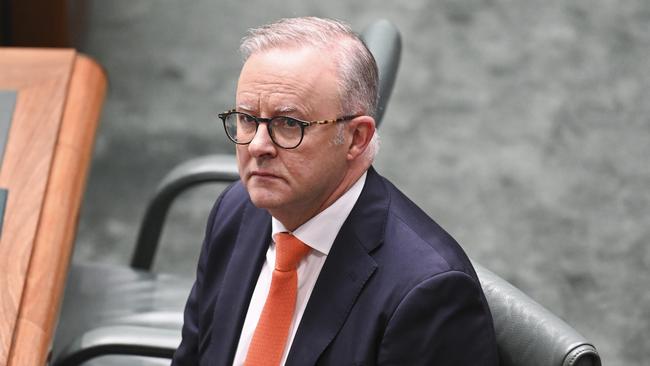May election firms as Labor sets budget for March 25
There are growing expectations Anthony Albanese will send voters to the polls in May, with Labor revealing its intentions to hand down a pre-election budget in late March.

There are growing expectations Anthony Albanese will send voters to the polls in May, with Labor revealing its intentions to hand down a pre-election budget in late March as it set in motion plans to hand the Prime Minister ammunition to kybosh the Coalition’s nuclear power push.
The draft parliamentary sitting schedule, tabled on Tuesday, revealed the government plans to hand down its fourth federal budget on the earlier-than-usual date of March 25, as a harbinger for a likely May election.
However, senior Labor sources have told The Australian a March election remains an option.
The announcement came after Labor moved to establish a parliamentary probe into nuclear energy, a bid to repudiate the Coalition’s plans to build seven taxpayer-funded nuclear power plants on the sites of former coal-fired power stations.
The inquiry will consider a host of issues associated with nuclear energy, including its cost, legal barriers, deployment timeframes, natural disaster risks, waste management and uranium transport.
According to the terms of reference tabled in parliament, the inquiry must hand down its final report no later than April 30, 2025, just weeks ahead of a mooted May poll. The committee can, however, hand down an interim report.
The expected attack on the Coalition’s signature policy would follow a March budget – for which senior Labor figures are already preparing – that offers Labor the opportunity to ply voters with pre-election cost-of-living sweeteners.
With underlying price pressures, some economists have warned against a pre-poll cash splash, saying extra spending risks exacerbating price pressures and pushing a projected $28.3bn deficit deeper into the red.
If a federal budget was to be held on March 25, the earliest Mr Albanese can hold a general election – where the House of Representative and half the Senate is on the ballot – would be May 3 as polling cannot take place until at least 33 days after writs are issued.
Under the Constitution, the latest Mr Albanese can hold an election is May 17, leaving only May 10 as another possible polling date.
Mr Albanese has repeatedly stated his intention to govern for a full three-year term and has rejected speculation he would call an early election.
Despite the draft program, the government can change the date for the budget or the election at any time.
During debate over the nuclear inquiry on Tuesday, Coalition MPs failed to move a series of amendments that, if successful, would have expanded its scope to include consideration of technology’s impact on energy affordability and reliability, and emissions reduction.
However, the opposition ultimately voted in support of the probe, arguing the forum would provide an opportunity to promote the benefits of nuclear energy.
“It has taken 2½ years for the Australian Labor Party and the Albanese government to make some form of an attempt to engage with the debate on the potential of zero-emissions nuclear energy in Australia,” opposition energy spokesman Ted O’Brien declared. “We come to the party.”
Labor hopes the inquiry will place extra pressure on the opposition to release key elements of its nuclear policy, including details on its cost and expected generation capacity, in an attempt to expose what it believes to be commercially unviable.
Welcoming the probe during question time, Energy Minister Chris Bowen rubbished the Coalition’s nuclear energy plans. “We cannot wait for the details to come out,’ he said, chastising the opposition for the repeated delays in releasing its policy.
A spokesman for Mr O’Brien said it remained the opposition’s intention to release the costings of its nuclear policy before Christmas.
However, the specific generation capacity of the seven commonwealth-owned nuclear power plants would be determined by a new “independent nuclear energy co-ordinating authority” and not released until after the election.
Energy policy analysts anticipate the cost of the Coalition’s taxpayer-funded tilt towards nuclear power would likely cost several hundred billion dollars, and could produce less than 4 per cent of the total generation capacity in the national energy market by 2050.
Budgets have previously been handed down in March in 2019 and 2022 to permit elections being held in May, a month when the document is traditionally released.





To join the conversation, please log in. Don't have an account? Register
Join the conversation, you are commenting as Logout